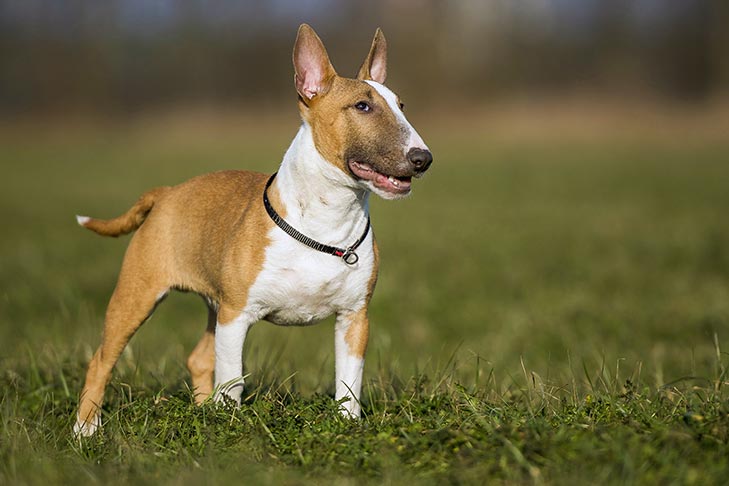Are you considering adding a Miniature Bull Terrier to your family? This breed is known for its unique appearance, playful personality, and loyalty to their owners. While they may have a reputation for being stubborn, with proper training and socialization, they can make wonderful companions. Before making a decision, it’s important to learn more about the Miniature Bull Terrier breed, their needs, and whether they are the right fit for your lifestyle.
Breed Category: Terrier
Country of Origin: England
Average Size:25-35 cm
Average Weight:8-15 kg
Average Life Span: 11-14 years
Grooming Requirements: Low
Exercise Requirements:Moderate
History and Origin
The Miniature Bull Terrier is a small and muscular breed of dog that was originally bred in England in the 19th century. The breed was created by crossing the English Bulldog with the White English Terrier, which is now extinct. The result was a smaller version of the Bull Terrier, which was originally bred for dog fighting and ratting. The Miniature Bull Terrier was first recognized as a separate breed in 1939 by the Kennel Club in the UK.
The Miniature Bull Terrier was originally bred for dog fighting, but this practice was outlawed in the UK in 1835. After this, the breed was used for ratting, which involved hunting and killing rats. The Miniature Bull Terrier was also used as a companion dog, and its popularity as a pet grew over time. The breed was first shown in dog shows in the late 1800s, and it quickly became popular among dog enthusiasts.
The Miniature Bull Terrier is a small and muscular dog that stands between 10 and 14 inches tall at the shoulder. It has a short, smooth coat that comes in a variety of colors, including white, black, brindle, and fawn. The breed is known for its distinctive egg-shaped head, which is a result of its Bulldog ancestry. The Miniature Bull Terrier is a loyal and affectionate dog that makes a great companion for families and individuals alike.
The Miniature Bull Terrier has had a number of famous owners over the years, including Winston Churchill, who owned a Miniature Bull Terrier named Rufus. The breed has also been featured in a number of movies and TV shows, including the movie “The Incredible Journey” and the TV show “The Littlest Hobo.” The Miniature Bull Terrier has also been used as a mascot for a number of sports teams, including the Boston Red Sox and the University of South Florida.
Today, the Miniature Bull Terrier is a popular breed of dog around the world. It is recognized by a number of kennel clubs, including the American Kennel Club and the United Kennel Club. The breed is known for its loyalty, intelligence, and affectionate nature, and it makes a great companion for families and individuals alike. The Miniature Bull Terrier is also a great choice for people who live in apartments or small homes, as
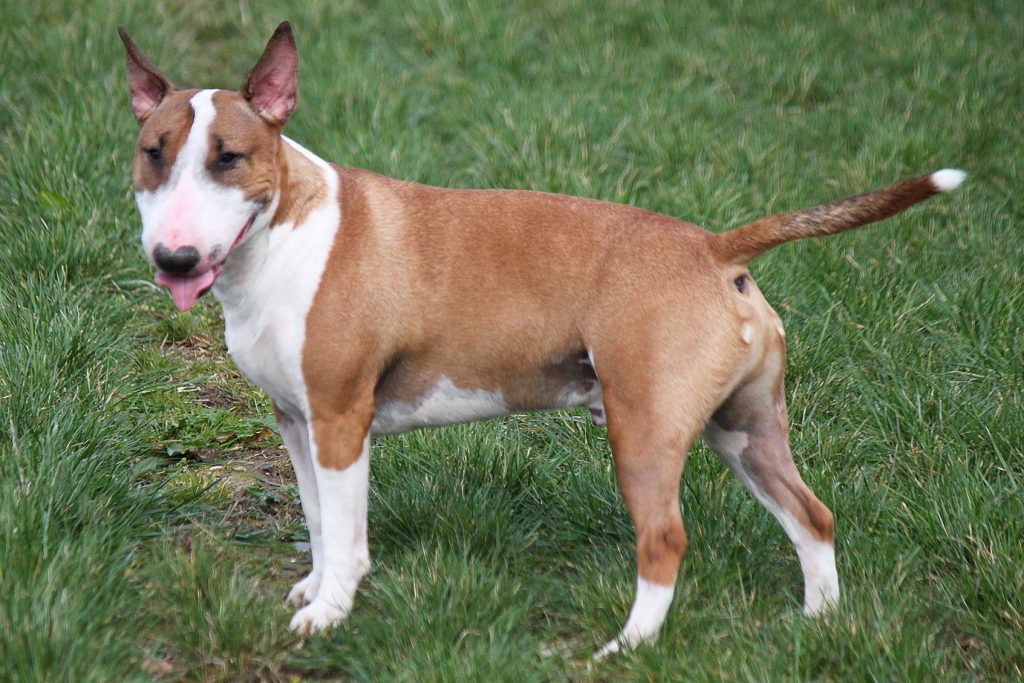
Size and Breed Category
The Miniature Bull Terrier is a small-sized breed of dog that is known for its muscular and sturdy build. They typically weigh between 9-15 kg and stand at a height of 25-35 cm at the shoulder. Their body is short and compact, with a broad chest and a well-defined waist. The Miniature Bull Terrier has a short, smooth coat that comes in a variety of colours, including white, black, brindle, and fawn. They have a distinctive egg-shaped head, with small, triangular-shaped eyes and erect ears. The breed is known for its playful and energetic nature, making them a popular choice for families with children.
The Miniature Bull Terrier is classified as a Terrier breed, which means they were originally bred for hunting and vermin control. They are a smaller version of the Bull Terrier, which was developed in the 19th century by crossing Bulldogs with Terriers. The Miniature Bull Terrier was first recognized as a separate breed in 1939, and since then, they have become a popular companion dog. They are known for their loyalty and affection towards their owners, but they can also be stubborn and independent at times. The breed requires regular exercise and mental stimulation to keep them happy and healthy. They are also prone to certain health issues, such as deafness and skin allergies, which potential owners should be aware of before adopting a Miniature Bull Terrier.
Fur Length and Colour
The fur of the Miniature Bull Terrier is short and smooth, with a glossy appearance. The texture of the fur is fine and dense, providing a soft and velvety feel to the touch. The fur is evenly distributed throughout the body, with no patches or bald spots. The Miniature Bull Terrier’s fur comes in a variety of colours, including white, black, brindle, fawn, and tri-colour. The most common colour is white, which can be solid or with coloured markings on the head and body. The black and brindle colours are also popular, with the black colour being solid and the brindle colour having a striped pattern. The fawn colour is a light brown shade, while the tri-colour is a combination of black, white, and tan. Overall, the Miniature Bull Terrier’s fur is a defining characteristic of the breed, providing a sleek and stylish appearance.
The Miniature Bull Terrier’s fur length is short, with a maximum length of 1 inch. The fur is easy to maintain, requiring minimal grooming and shedding. The fur does not mat or tangle easily, making it a low-maintenance breed in terms of grooming. The fur also provides protection against the elements, keeping the Miniature Bull Terrier warm in cold weather and cool in hot weather. The fur is also hypoallergenic, making it a suitable breed for people with allergies. The Miniature Bull Terrier’s fur is a key feature of the breed, providing both aesthetic and functional benefits.
Termperament and Trainability
Miniature Bull Terriers are known for their energetic and playful temperament. They are highly social dogs that thrive on human interaction and attention. They are also known for their stubbornness, which can make training a challenge. However, with consistent and patient training, Miniature Bull Terriers can be taught to obey commands and perform tricks. They are also known for their loyalty and protective nature towards their owners, making them excellent watchdogs. Overall, Miniature Bull Terriers require an experienced owner who can provide them with plenty of exercise and mental stimulation to keep them happy and healthy.
When it comes to trainability, Miniature Bull Terriers are known for their intelligence and quick learning abilities. They are highly motivated by positive reinforcement and respond well to reward-based training methods. However, they can also be easily distracted and may require extra patience and consistency during training sessions. Miniature Bull Terriers are also known for their high energy levels, which can make them difficult to train if they are not given enough exercise and mental stimulation. Overall, Miniature Bull Terriers are trainable dogs that require a firm and consistent approach to training. With the right training and socialization, they can make excellent family pets and companions.
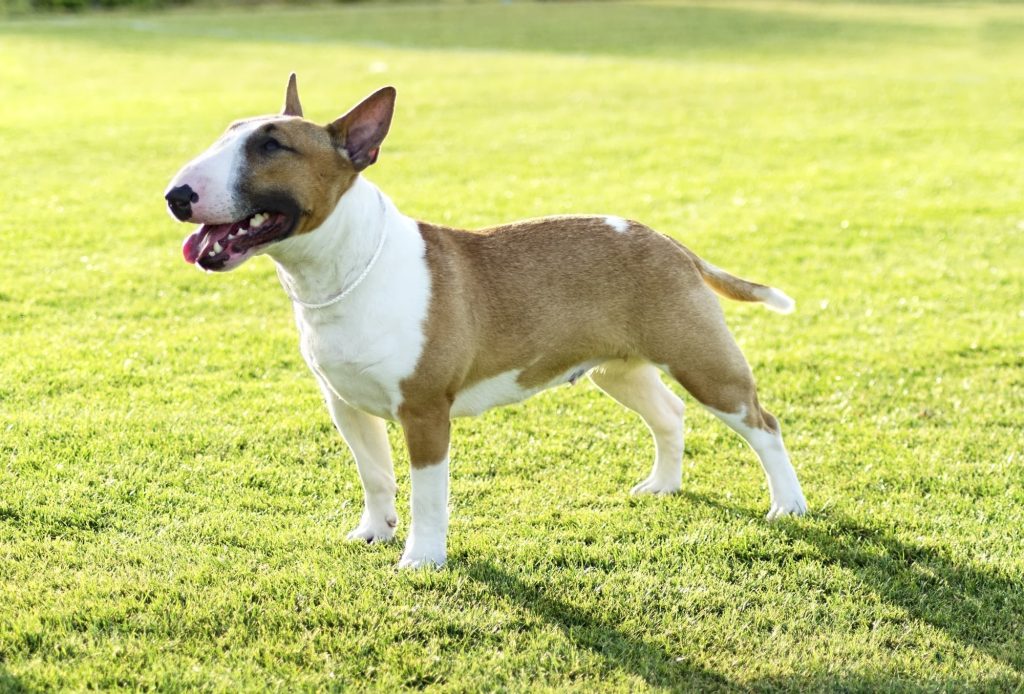
Known Health Conditions
Miniature Bull Terriers are prone to a number of health conditions, including deafness, skin allergies, and kidney disease. Deafness is a common issue in this breed, with up to 20% of Miniature Bull Terriers being affected. This can be caused by a genetic mutation or damage to the ear canal. Skin allergies are also a concern, with Miniature Bull Terriers being prone to atopic dermatitis and other skin conditions. These allergies can be triggered by environmental factors such as pollen or dust, as well as certain foods. Finally, kidney disease is a serious health issue in this breed, with Miniature Bull Terriers being at a higher risk than other breeds. This can lead to kidney failure and other complications if not properly managed.
Another health condition that Miniature Bull Terriers are prone to is patellar luxation, which is a dislocation of the kneecap. This can cause pain and discomfort for the dog, and may require surgery to correct. Additionally, Miniature Bull Terriers are at a higher risk for developing heart disease, particularly mitral valve disease. This can lead to heart failure if left untreated. Finally, the breed is also prone to certain eye conditions, such as cataracts and glaucoma. These can cause vision loss and may require surgery to correct. Regular veterinary check-ups and proper care can help manage these health conditions and ensure that Miniature Bull Terriers live long, healthy lives.
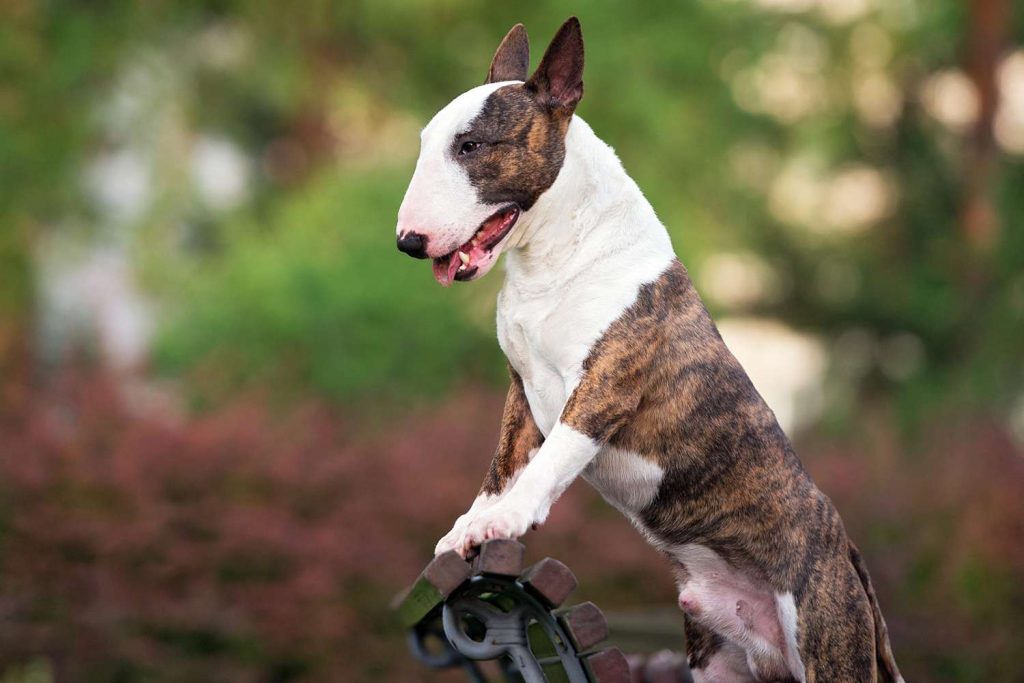
Openness to Strangers
Miniature Bull Terriers have a reputation for being friendly and outgoing towards strangers. They are known to be sociable dogs that enjoy meeting new people and making new friends. This breed is often described as being very affectionate and loving towards their owners, but they are also known to be very welcoming to strangers. They are not typically aggressive towards people they do not know, and they are often eager to greet new visitors to their home. Miniature Bull Terriers are also known for their playful and energetic personalities, which can make them a lot of fun to be around.
Despite their small size, Miniature Bull Terriers are known for their big personalities and their love of adventure. They are often described as being very curious and inquisitive, and they are always eager to explore new places and meet new people. This breed is known for their high energy levels and their love of play, which can make them a lot of fun to be around. They are also known for their loyalty and devotion to their owners, which can make them excellent companions for those who are looking for a dog that will be a true friend and companion. Overall, Miniature Bull Terriers are a breed that is known for their openness to strangers and their love of adventure and play.
Playfulness Level
The Miniature Bull Terrier is a highly energetic and playful breed of dog. They are known for their lively and mischievous nature, which makes them a popular choice for families with children. These dogs love to play and are always up for a game of fetch or tug-of-war. They are also very intelligent and enjoy learning new tricks and commands, which can help to keep them mentally stimulated and engaged.
Despite their small size, Miniature Bull Terriers have a big personality and are not afraid to show it. They are confident and outgoing dogs that love to be the center of attention. They are also very loyal and affectionate towards their owners, and enjoy spending time with them both indoors and outdoors. However, due to their high energy levels, they require plenty of exercise and playtime to keep them happy and healthy. Overall, the Miniature Bull Terrier is a fun-loving and playful breed that is sure to bring joy and laughter to any household.
Suitability as a Pet for Children
Miniature Bull Terriers have a lively and playful personality, making them a great choice for families with children. They are known for their loyalty and affection towards their owners, and are always eager to please. With proper training and socialization, Miniature Bull Terriers can be excellent companions for children, as they are patient and gentle with them. They are also highly adaptable and can thrive in both urban and rural environments. However, as with any breed, it is important to supervise interactions between children and dogs to ensure safety for both parties.
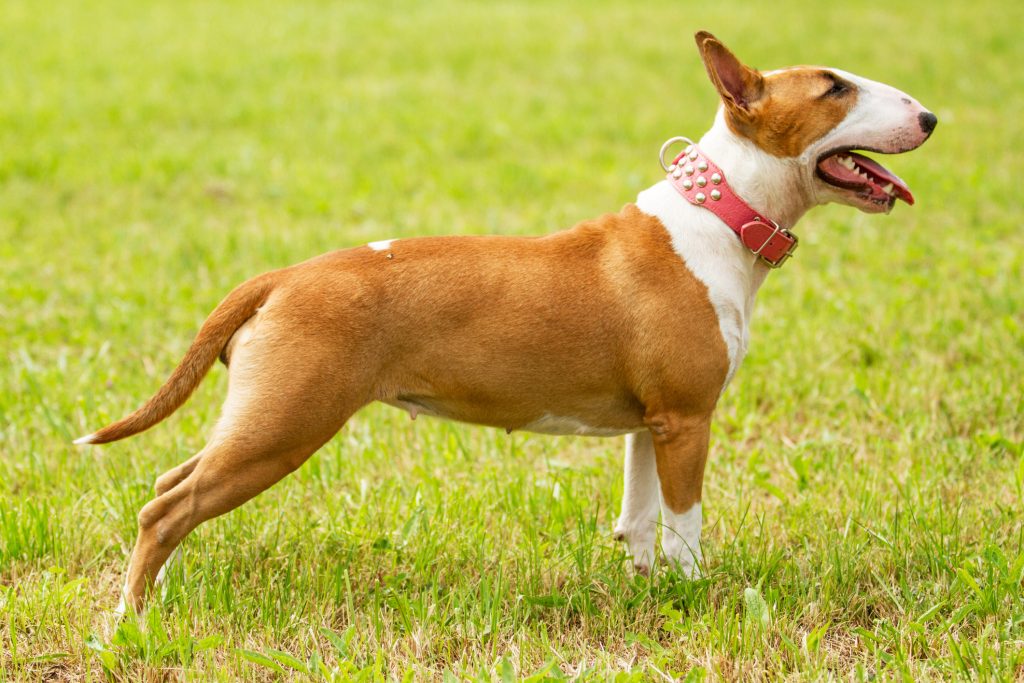
Exercise Needs
Miniature Bull Terriers are a highly energetic breed that require a significant amount of exercise to maintain their physical and mental health. As a medium-sized dog, they need at least 60 minutes of daily exercise, which can be achieved through a combination of walks, runs, and playtime. It is important to note that Miniature Bull Terriers have a high prey drive and may chase after small animals, so it is recommended to keep them on a leash or in a secure area during exercise. Additionally, they thrive on mental stimulation, so incorporating training and interactive toys into their exercise routine can help keep them engaged and happy.
Due to their high energy levels, Miniature Bull Terriers are not recommended for apartment living or households with limited outdoor space. They require a large, securely fenced yard where they can run and play freely. It is also important to note that Miniature Bull Terriers are prone to obesity, so it is crucial to monitor their diet and exercise routine to prevent weight gain. Regular exercise not only helps maintain their physical health but also helps prevent destructive behavior that can result from boredom or pent-up energy. Overall, providing adequate exercise for a Miniature Bull Terrier is essential for their overall well-being and happiness.
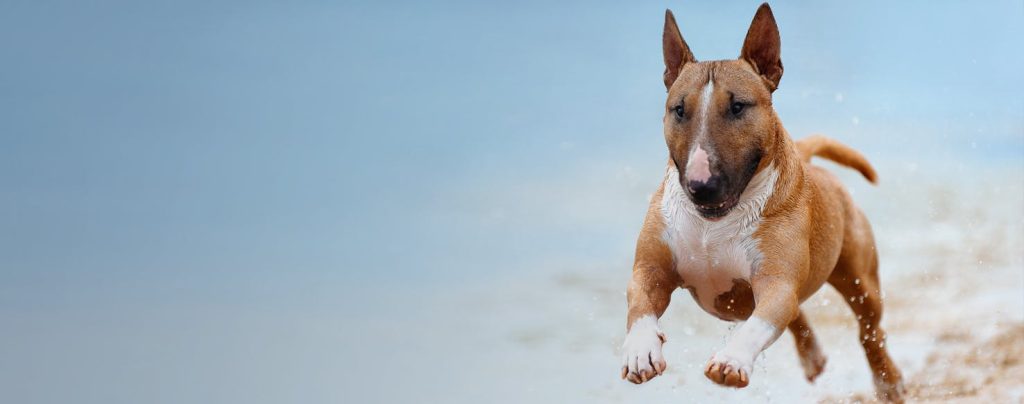
Suitability for a Multi-Pet Family
Miniature Bull Terriers have a reputation for being strong-willed and independent. They are known to be loyal and affectionate towards their owners, but their interactions with other pets can vary. Some Miniature Bull Terriers may get along well with other pets, while others may be more aggressive or territorial. It is important to socialize Miniature Bull Terriers from a young age and supervise their interactions with other pets to ensure they behave appropriately.
Housing Requirements
Miniature Bull Terriers require a living space that is suitable for their size and energy levels. They need a home with enough room for them to move around freely and play. A house with a garden or yard is ideal for them to run and exercise. The garden should be securely fenced to prevent them from escaping and getting lost. Miniature Bull Terriers are active dogs and need regular exercise to maintain their physical and mental health. They enjoy going for walks and playing games with their owners. A daily walk of at least 30 minutes is recommended to keep them fit and healthy. Miniature Bull Terriers are also known for their love of digging, so it is important to provide them with a designated area where they can dig without causing damage to the garden or yard.
Miniature Bull Terriers require a comfortable and safe sleeping area. A soft and cozy bed is essential for them to rest and relax after a long day of playing and exercising. The bed should be placed in a quiet and peaceful area of the house where they can sleep undisturbed. Miniature Bull Terriers are social dogs and enjoy being around their owners, so it is important to provide them with a space where they can be close to their family. They also need access to fresh water and food at all times. A feeding schedule should be established to ensure they are getting the right amount of food and nutrients. Miniature Bull Terriers are prone to obesity, so it is important to monitor their diet and exercise levels to prevent weight gain.
Summary
Miniature Bull Terriers make great pets for active families who are looking for a loyal and energetic companion. They require regular exercise and mental stimulation to keep them happy and healthy. With proper training and socialization, they can be friendly and affectionate towards their owners and other pets. However, they may not be suitable for households with small children or other small pets due to their high energy levels and strong prey drive. It is important to research and understand the breed’s temperament and needs before bringing one into your home.
Miniature Bull Terrier Dog FAQS
Miniature Bull Terriers can be stubborn and require consistent training and positive reinforcement.
Miniature Bull Terriers can adapt to apartment living as long as they get enough exercise and mental stimulation.
Miniature Bull Terriers can be good with children if they are socialized properly and trained to be gentle.
Miniature Bull Terriers can be prone to deafness, skin allergies, and kidney disease. Regular vet check-ups are important.
Miniature Bull Terriers have a short, smooth coat and do not shed excessively.
Miniature Bull Terriers need at least 30-60 minutes of exercise per day, such as walks or playtime in a fenced yard.
Miniature Bull Terriers only need occasional brushing and bathing as needed.
Miniature Bull Terriers usually grow to be around 25-35 cm tall.
The average weight of a Miniature Bull Terrier is between 8-15 kg.
The average lifespan of a Miniature Bull Terrier is 11-14 years.
